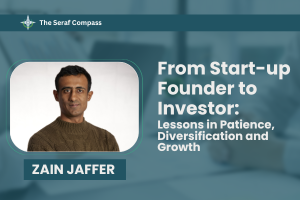 At Seraf, we believe in the power of shared knowledge and diverse perspectives in the realm of early-stage investing. To foster this exchange, we periodically invite guest authors to contribute their unique insights, experiences, and opinions on the intricacies of the investment landscape.
At Seraf, we believe in the power of shared knowledge and diverse perspectives in the realm of early-stage investing. To foster this exchange, we periodically invite guest authors to contribute their unique insights, experiences, and opinions on the intricacies of the investment landscape.
Today, we are pleased to feature Zain Jaffer, an accomplished entrepreneur and investor who is actively involved in a range of initiatives, including real estate, technology start-ups, and private equity through his family office, Zain Ventures. In addition to his investment endeavors, Zain is dedicated to supporting underrepresented causes and underserved communities through the Zain Jaffer Foundation.
Zain's Journey
The shift from building a company to becoming an investor is an experience I’ve realized can’t all be learned from a playbook. It’s a massive shift I didn’t fully appreciate until I experienced it firsthand. As a founder, I was used to a fast-paced, high-reward environment. But as I moved into investing, I quickly realized that this new world required a different mindset. The journey has been a learning experience, one that has shaped how I approach portfolio management and long-term wealth building.
Here are some of the key insights I’ve gained along the way.
There is value in conventional wisdom
During my time as CEO of Vungle, I received a lot of advice that, quite frankly, I felt was unnecessary at the time. I was laser-focused on growth and saw recommendations like hiring experienced sales leaders or refining our product marketing as distractions from that mission. I wanted to move fast and didn’t always appreciate the broader, structural advice my investors and board members were giving me.
Now, sitting on multiple boards, I see the same patterns emerge across companies. The very advice I once brushed off—around hiring strong leaders, solidifying accounting practices, and focusing on long-term product marketing—is now the advice I find myself repeating to other founders. These elements aren't secondary; they form the infrastructure that allows a company to scale sustainably.
Not every win will be explosive
One of the toughest adjustments was tempering my expectations. At Vungle, early investors saw massive returns—some up to 200x. That kind of success skewed my perception as I transitioned into investing, where I anticipated similar outcomes for every venture.
However, I quickly learned that these returns are the exception, not the rule. Many investments, even those with great potential, don’t experience explosive growth overnight. Learning to appreciate steady progress, rather than always chasing high multiples, has been an essential shift in my approach.
Investing is a bigger balancing act
Initially, I was drawn to the high-growth potential of startups and tech. But over time, I saw how volatile my portfolio had become. Diversifying into bonds, real estate, and structured notes felt less exciting, especially when projected annual returns were single digits compared to the potential 3x or more from tech. Yet, this diversification became crucial. It provided stability when markets shifted and protected my overall wealth during downturns. The balance between high-risk and more traditional assets has proven to be a key factor in long-term success.
Due diligence is a non-negotiable
In entrepreneurship, gut instinct can be powerful. But when it comes to investing, it’s not enough. I initially underestimated how much due diligence goes into evaluating fund managers and investment opportunities. I’ve since learned (in some cases, the hard way) that it's essential to dig into the details — whether it be reviewing financials or conducting thorough reference checks. Some early mistakes could have been avoided with more scrutiny, teaching me that deep, comprehensive due diligence is critical to making sound decisions.
It pays to play the long game
The biggest adjustment has been learning to embrace patience. As a founder, I was always pushing for growth, but investing is about the long-term. Early in my investing career, I would get frustrated when bonds or traditional assets yielded modest returns, especially when compared to high-growth tech stocks. But after witnessing multiple market cycles, I’ve come to appreciate the value of steady, reliable returns. Patience has become a key part of my strategy, allowing me to maintain a balanced portfolio that weathers volatility and grows over time.
Embracing the evolution
The transition from founder to investor has been full of lessons that continue to shape my approach today. Recalibrating my expectations, understanding the power of diversification, committing to rigorous due diligence, and embracing patience have all contributed to my evolution as an investor.
While the thrill of entrepreneurship is hard to match, I now find fulfillment in playing the long game, building a portfolio that stands the test of time, supporting others on their journey, and valuing the advice that helps companies grow sustainably.

